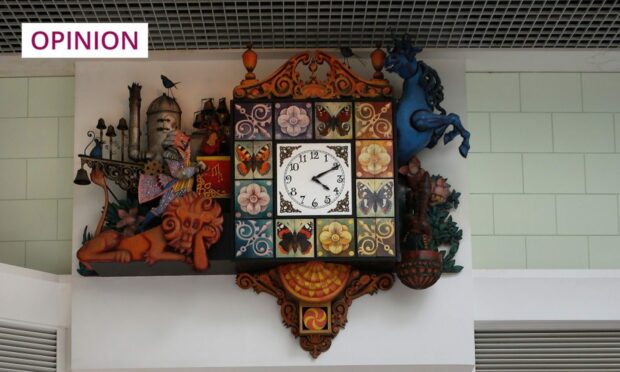Sir, – The commissioning of the first of Gordon Brown’s two pork-barrel white elephants, known in navy speak as HMS Big Lizzie, will be followed by HMS Chuck. Naval top brass are frightfully proud, of course, but the two carriers have been rightly described by a former chief of defence staff as ‘vulnerable metal cans’.
Sadly the carriers and the new fleet of Dreadnought submarines are wholly irrelevant to our security needs. They’re no use whatsoever against terrorism or cyberwarfare – the two threats which preoccupy all our security services – but will eat up a vast slice of a defence budget which is already under huge pressure.
The “capability review” now being carried out will inevitably lead to more cuts at a time when the navy is short of sailors, the RAF short of pilots, the army the smallest since the time of Cromwell.
And the spoof interview with Admiral Sir George Parr is coming true: the carrier decks will be largely “aircraft free”.
Rev Dr John Cameron.
10 Howard Place,
St Andrews.
The EU is not run by Germany
Sir, – Alan Bell (Letters, December 7) is wrong to say that the EU is governed by Germany. It is run by democratically elected MEPs from all EU countries, including six from Scotland.
It has little control over member states, confining itself to regulations that only make sense if they are applied to the whole EU (a Green principle called “subsidiarity”).
Contrast this with Westminster, which has complete control over every aspect of life in Scotland, except for those few areas that they have reluctantly devolved to Holyrood.
Andrew Collins.
Ladyburn House,
Skinners Steps,
Cupar.
That’s not a £130m saving
Sir, – I wonder where Ken Clark gets “the amalgamation saving £130 million a year” for Police Scotland? (Letters, December 4).
Audit Scotland said that Scotland’s police bodies are facing a £190 million deficit after years of “unacceptable” weak leadership.
Ms Caroline Gardner, the Auditor General for Scotland, accused the Scottish Police Authority (SPA) of deliberately concealing how Police Scotland’s annual budget of £1.1 billion was spent.
The botched IT system costing £19.3 million was written down to just £200,000.
Recovering the cost from the firm responsible seems unlikely.
Ms Gardner complained she had been forced to express a “modified opinion” on the SPA accounts in all three years since Police Scotland came into being.
The Scottish Government were also forced to give an extra £50 million for one-off reforms.
So there is a huge ongoing deficit and I am therefore at a loss to find any of Ken Clark’s £130 million savings.
Clark Cross.
138 Springfield Road,
Linlithgow.
Taxing issue
Sir, – I read in the Courier last month that the threshold for 40% tax is £43,000 in Scotland compared to £45,000 in England, now even higher. I have contacted the tax office who say the threshold in Scotland is actually £31,500. I also have this on one if their forms.
I have asked HMRC for clarification but have had no response.
Now I read that Ms Sturgeon is going to increase tax even more. And she wonders why she is losing votes.
Sheena Urquhart.
4 Gallowden Avenue,
Arbroath.
No case for independence
Sir, – Nicola Sturgeon tells us that in the long-awaited Wilson report arguments for Scotland leaving the UK will be rejuvenated.
If Andrew Wilson is true to his word, his report will not rely on oil revenues, as he admits the 2013 White Paper did, to bolster the Scottish economy. These are now negative, in that oil revenues bring in no tax income and incur costs from decommissioning spent fields.
Apparently, proposals will include a new Scottish currency. Where is Scotland to find the £60 billion or so required to support a new currency and a new central bank? There will be no spare cash once Scotland forfeits the Barnett subvention.
Another proposal is to attract English-based businesses to Scotland. That is going to work out well after the Scottish government raised taxes substantially. The more likely scenario is that businesses and wealthier individuals will flee Scotland for a more benign tax regime in England.
Derek Mackay, the deeply unimpressive finance minister, says independence is becoming ‘an increasingly irresistible alternative to Brexit’. Does he still not know that Scotland does 12 % of its trade with the EU and 48 % of it with the rest of the UK?
Jill Stephenson.
Glenlockhart Valley,
Edinburgh.
Some hope for Scotland
Sir, – Now that full madness of Brexit is becoming more apparent, and the incompetence of our Tory Government is revealed in all its shameful disarray, I was comforted by the result of the most recent Survation opinion poll, which found support for an independent Scotland is up by 2% from the 2014 independence referendum, up 4% from the last poll in June, and now standing at 47%.
Having said that, I’m surprised, given the performance of the UK Government, and the dismal prospects for the UK after Brexit, that the figure is not much higher.
Never mind, in the midst of the Brexit gloom there is a little light of opportunity shining in the distance for Scotland.
Les Mackay.
5 Carmichael Gardens,
Dundee.
Taxes used for popularity
Sir, – The conundrum for the SNP as it builds up to raise taxes next week, is that it draws attention to the choices they have already made using Scottish tax payers’ money.
To date, while the rates of tax paid have been either the same or similar comparing Scotland and the rest of the UK, some have perhaps not been too troubled by the SNP’s tendency to fund a wide range of universal benefits without proper regard for where the need is greatest.
The cost has been felt in the consequent squeezing of local authority funding and in turn education budgets, and across other critical public services, like NHS Scotland, with the overall fiscal deficit being filled by some £9 billion per annum of top-up funding from the rest of the UK.
Now as the Scottish Government proposes to raise more taxes, people in Scotland will wonder whether some of the SNP’s largesse with public funds is really in Scotland’s best interests, or simply to bolster the SNP’s popularity.
Keith Howell,
White Moss,
West Linton.









